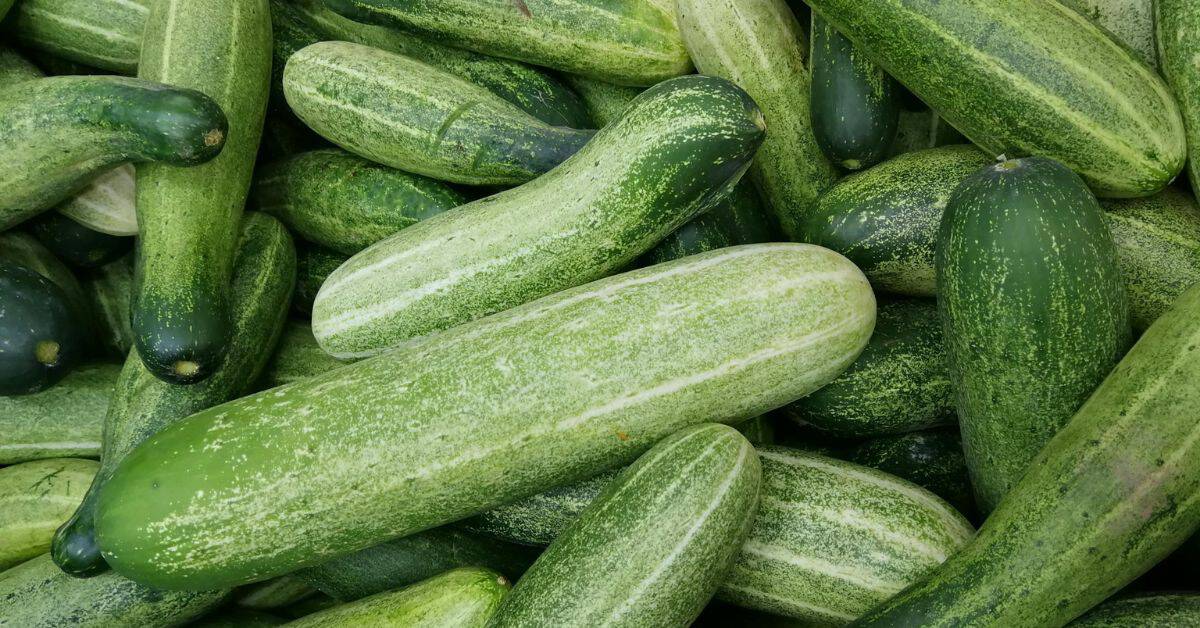What is Cucumber
Cucumber (Cucumis sativus) is a widely cultivated plant belonging to the gourd family, Cucurbitaceae. Originating from South Asia, cucumbers are known for their cylindrical shape and crisp, refreshing taste. They are typically green, although variations in color and size exist. Cucumbers are composed of about 95% water, making them exceptionally hydrating and low in calories, which contributes to their popularity in salads and as a low-calorie snack.
There are three main types of cucumbers: slicing, pickling, and seedless. Slicing cucumbers are commonly consumed fresh, pickling cucumbers are smaller and used for making pickles, and seedless cucumbers, also known as hothouse cucumbers, are bred to have fewer seeds and thinner skins. Cucumbers are rich in vitamins K and C, potassium, and antioxidants. They are also used in traditional medicine and skincare for their soothing and anti-inflammatory properties.
Nutrition Facts of Cucumber
Cucumbers are low in calories but rich in essential nutrients and hydration. Here are the nutrition facts for a 100-gram serving of raw cucumber with the peel:
- Calories: 15
- Water: 95%
- Protein: 0.6 grams
- Fat: 0.1 grams
- Carbohydrates: 3.6 grams
- Sugars: 1.7 grams
- Fiber: 0.5 grams
Vitamins and Minerals:
- Vitamin K: 16.4 micrograms (21% of the Daily Value, DV)
- Vitamin C: 2.8 milligrams (3% of the DV)
- Potassium: 147 milligrams (4% of the DV)
- Magnesium: 13 milligrams (3% of the DV)
- Manganese: 0.079 milligrams (4% of the DV)
Other Nutrients:
- Folate: 7 micrograms (2% of the DV)
- Vitamin A: 105 International Units (2% of the DV)
- Phosphorus: 24 milligrams (2% of the DV)
Cucumbers also contain small amounts of other vitamins and minerals, including calcium, iron, and B vitamins. Their high water content helps in maintaining hydration, and the presence of antioxidants such as beta-carotene supports overall health.
19 health benefits of cucumber
Cucumbers offer several health benefits due to their nutrient content and high water composition. Here are some key benefits:
- Hydration: With around 95% water content, cucumbers are excellent for staying hydrated, especially in hot weather or after exercise.
- Weight Loss: Low in calories and high in water, cucumbers are a great addition to a weight-loss diet. They can help you feel full without consuming a lot of calories.
- Nutrient-Rich: Cucumbers provide essential vitamins and minerals, such as vitamins K and C, potassium, and magnesium, which support overall health.
- Antioxidants: They contain antioxidants, including flavonoids and tannins, which help combat oxidative stress and reduce inflammation, potentially lowering the risk of chronic diseases.
- Digestive Health: The fiber in cucumbers aids in digestion and helps prevent constipation. The high water content also helps keep the digestive tract functioning smoothly.
- Skin Health: Cucumbers are used in skincare for their cooling and soothing properties. They can reduce swelling, inflammation, and irritation, and are often applied topically to relieve sunburn and puffy eyes.
- Bone Health: The vitamin K in cucumbers plays a crucial role in bone health by helping in bone formation and strengthening.
- Heart Health: Potassium and magnesium in cucumbers help maintain healthy blood pressure levels, and the antioxidants can reduce the risk of heart disease.
- Blood Sugar Control: Cucumbers may help in managing blood sugar levels. Studies have shown that cucumbers can reduce blood sugar levels and lower the risk of complications related to diabetes.
- Detoxification: The high water content in cucumbers aids in flushing out toxins from the body, supporting kidney function and overall detoxification.
- Anti-Cancer Properties: Cucumbers contain compounds like cucurbitacins and lignans, which have shown potential in inhibiting the growth of cancer cells in some studies.
- Oral Health: Chewing cucumber can stimulate the production of saliva, which helps in neutralizing acids and maintaining a healthy oral environment, potentially reducing bad breath.
- Anti-Inflammatory Effects: The antioxidants and anti-inflammatory compounds in cucumbers can help reduce inflammation in the body, which is beneficial for conditions like arthritis and other inflammatory diseases.
- Electrolyte Balance: Cucumbers contain electrolytes like potassium, which are essential for maintaining the body’s electrolyte balance, crucial for muscle and nerve function.
- Improved Vision: The beta-carotene and vitamin A in cucumbers support eye health and can help in preventing age-related macular degeneration and other vision problems.
- Supports Healthy Hair: Silica and sulfur present in cucumbers are known to strengthen and promote healthy hair growth.
- Stress Relief: B vitamins found in cucumbers, such as B1, B5, and B7, are known to help ease feelings of anxiety and stress.
- Hormone Regulation: The phytoestrogens in cucumbers may help in balancing hormones, which can be particularly beneficial for women experiencing menopause.
- Heartburn Relief: Cucumbers have a cooling effect and their alkaline nature can help in relieving heartburn and acidity.
Incorporating cucumbers into your diet can contribute to overall wellness and help in maintaining various aspects of health.
Incorporating cucumbers into your diet can contribute to a variety of health benefits, enhancing overall wellness and supporting the body’s natural processes.
# 22 Amazing Health Benefits of Eating Mangoes You Need to Know
The Conclusion
Cucumbers are a highly nutritious and versatile vegetable that provide numerous health benefits. Their high water content makes them excellent for hydration, while their low calorie count supports weight management. Rich in essential vitamins and minerals, cucumbers contribute to overall health, including improved digestion, bone health, and heart health. Their antioxidants and anti-inflammatory properties help combat oxidative stress and inflammation, potentially lowering the risk of chronic diseases. Additionally, cucumbers offer benefits for skin, hair, and even stress relief. Incorporating cucumbers into your diet can enhance your health and well-being in multiple ways, making them a valuable addition to a balanced diet.



